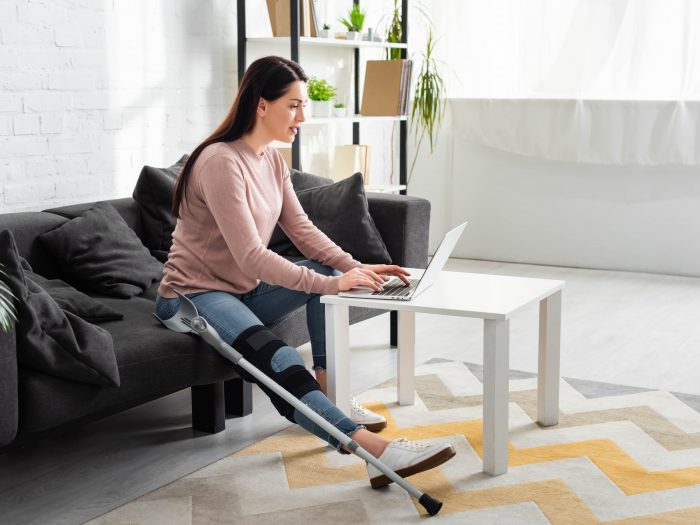Sponsored: Helmsman Management Services
How Injured Worker Advocacy Helped Overcome 3 Early WC Claims Management Challenges During COVID-19

As the months have passed, many businesses have shifted operations to remain functional during the novel coronavirus pandemic. The team at Helmsman Management Services knew that it had to be thoughtful about its approach so that employees could still be effective and injured workers would feel supported.
“Like many companies, we suspended all work-related travel and had employees begin working remotely in early March due to the risk of COVID-19,” said Carolyn Turpin, vice president and regional manager for the West at Helmsman Management Services.
These changes were quickly implemented, with the goal of protecting employees’ safety and well-being while continuing to be there for customers and injured workers.
“We had to make sure our people were fully functioning at home so that they could properly handle workers compensation claims, be available, and provide support,” explained Turpin.
A key part of that support was helping to overcome the early workers compensation claims management challenges presented by the pandemic. Here are three ways Helmsman Management Services and its claims team continued to advocate for injured workers and drive positive outcomes.
1) Proactively engaging with injured workers to maintain strong connections and focus on recovery.
With the many restrictions in place to limit the spread of the virus, most people stayed at home and had limited contact with extended family, friends and co-workers. As a result, many felt somewhat isolated — and the experience for injured workers was no different. But in addition to feeling disconnected from loved ones, they may have also felt it with their recovery.
For most injured workers, this was their first time experiencing a work-related injury, and they were unsure of what to expect under normal circumstances. As everything shifted remotely, some questioned how interactions with claims specialists might change their experiences as the pandemic went on.
Despite the challenges of working remotely, Helmsman’s claims specialists still wanted to make clear that they were available for their clients
“Even if we weren’t in the office, we wanted injured workers to know that they could get in touch with us and that necessary care and other resources were accessible,” Turpin said.
This proactive outreach was critical in building trust and communication between claims specialists and injured workers and maintaining focus on recovery.
2) Providing effective ways to navigate medical care to minimize the adverse impact of stay-at-home orders.
 Stay-at-home orders and social distancing guidelines have been in effect since mid-March, and many hospitals had to make the tough call to pause appointments for non-emergency care. As a result, many injured workers needed a different means to access their physicians, physical therapists and other care providers.
Stay-at-home orders and social distancing guidelines have been in effect since mid-March, and many hospitals had to make the tough call to pause appointments for non-emergency care. As a result, many injured workers needed a different means to access their physicians, physical therapists and other care providers.
“The inability for injured workers to see their physicians in person was a big challenge to overcome,” said Turpin.
Luckily, telemedicine was already available.
Turpin said that encouraging the use of telemedicine, which can be used to treat a variety of injuries and for rehabilitation services, has played a large role in worker advocacy during COVID-19.
It’s a convenient tool placed right in the hands of injured workers so they can speak to their doctors and even receive physical therapy, if needed.
Such technologies are not new to workers compensation, but the pandemic has certainly brought them to the forefront of claims management. According to data collected by Helmsman, the company has seen a 5,000% increase in telemedicine visits between March and May of this year.
“As part of the claims management process, it’s vital for injured workers to continue their care and work towards recovery. Telemedicine has kept these critical services going during the pandemic” said Turpin.
3) Bringing sensitivity to pandemic-related stressors that could impact an injured worker’s mindset.
In addition to managing the stress that comes with suffering an injury, COVID-19 has brought on its own set of stressors.
In a “typical” claim, the injured worker is likely feeling anxious due to being out of work, in addition to worries over recovery. COVID-19 has amplified those concerns and added some new ones.
“An injured worker is thinking, ‘Will I fully recover from this injury, will my benefits be impacted, am I still going to have a job at the end of this?’ COVID put a lot of stress on job security as businesses shut down,” said Turpin.
“Families are struggling to balance childcare and work during the pandemic. Others are managing homeschooling or caregiving as loved ones fall ill. So, there is work stress, coupled with life stress, coupled with injury and recovery.”
It is a lot to process for someone who is recently injured, and claims specialists play a vital role in helping to curb these feelings of unrest.
In this unprecedented time, Turpin said, it has never been more critical to approach workplace injury-related absence with an empathetic point of view. The claim specialist’s focus should be on what’s best for the injured worker in order to maintain trust and understanding. Within the Helmsman team, there is a continued focus on putting people first and making things simple, with reminders at meetings, internal huddles, trainings and presentations.
“It’s critical to recognize that this kind of upheaval has been a highly sensitive area for injured workers,” said Turpin. “In order to ease worries and help workers through, it is imperative to emphasize that recovery is more than return-to-work: It is about their emotional well-being.”
An Empathetic and Dedicated Approach to Advocacy Delivers
This global pandemic has brought on its fair share of challenges, no doubt, but by quickly identifying these challenges and working with injured workers, Helmsman’s claims teams continue to provide care and deliver the best possible outcomes.
“The entire workers compensation claims management industry is going through a transformation thanks to the different technologies, such as expanded use of telemedicine, and the new processes put into place during the pandemic,” said Turpin.
She predicts, too, that some of these technologies and processes will last beyond the short-term, changing the game for claims management moving forward. This is something she believes claims management teams must prepare for to maintain positive outcomes.
As part of its approach, Helmsman is doing just that: investing in the processes put in place in response to COVID-19. That started with continuing to promote a can-do culture amongst its employees and providing an infrastructure for its teams to do their best work, no matter where they are.
“We believe and see that when you treat injured workers with compassion and humanity, better results are achieved for the worker and the employer,” Turpin said. “COVID-19 tested this framework and the results show that an injured worker advocacy model is a high-impact strategy that has worked and will continue to show results.”
To learn more, visit: https://www.helmsmantpa.com/.











